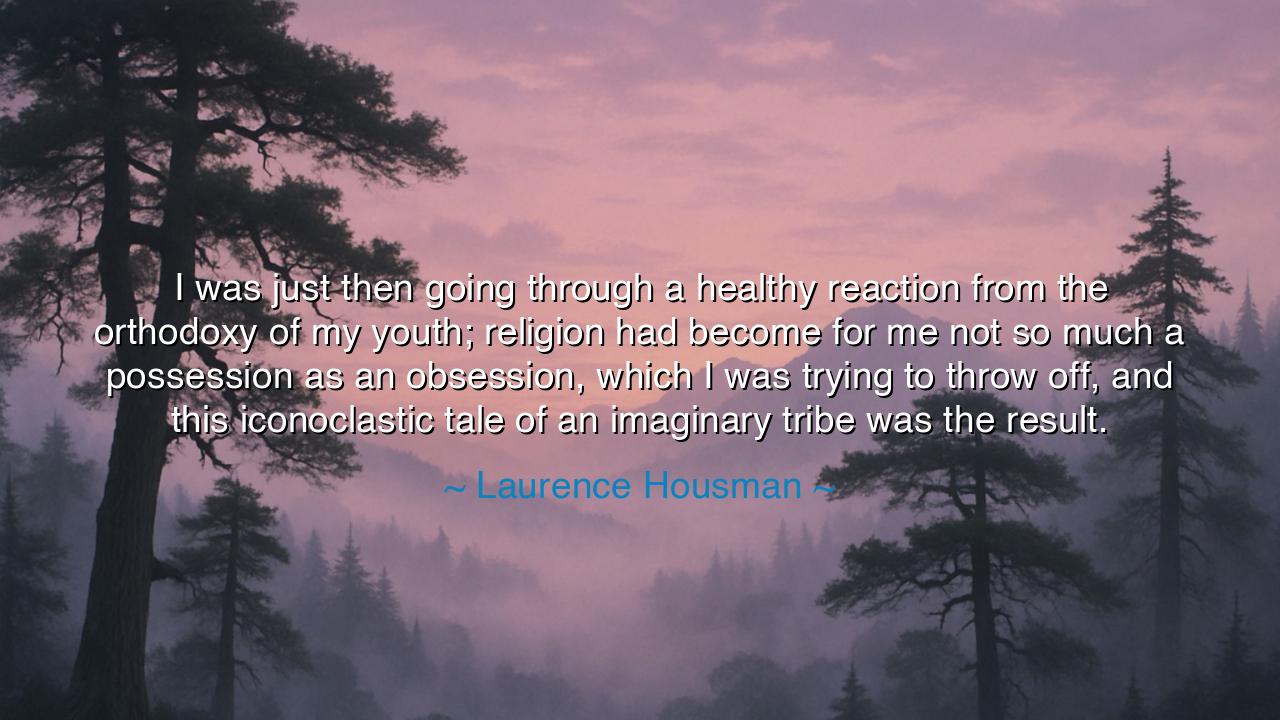
I was just then going through a healthy reaction from the
I was just then going through a healthy reaction from the orthodoxy of my youth; religion had become for me not so much a possession as an obsession, which I was trying to throw off, and this iconoclastic tale of an imaginary tribe was the result.






The words of Laurence Housman—“I was just then going through a healthy reaction from the orthodoxy of my youth; religion had become for me not so much a possession as an obsession, which I was trying to throw off, and this iconoclastic tale of an imaginary tribe was the result.”—speak to the eternal struggle between tradition and freedom, between the chains of unquestioned belief and the yearning of the soul for liberation. They are words of rebellion, but not of rebellion for its own sake; they are the confession of a man who sought truth beyond the boundaries of the teachings pressed upon him in his youth. His words are a testimony that faith, when it loses balance, can cease to be a comfort and become instead a burden—a shadow that follows a man until he dares to confront it.
The origin of these words lies in Housman’s own life, for he was both a writer and an artist whose works often defied the conventions of his time. He grew up under the heavy mantle of orthodoxy, the strict doctrines that demanded obedience of thought and conformity of spirit. Yet as his mind matured, he began to see that what once was a possession—a gift meant to enrich—had become an obsession, gnawing at his conscience and binding him with fear. Out of this inner struggle he gave birth to his creative works, including tales that challenged accepted dogmas. In them, he sought to cast down idols of unquestioned belief and carve a path to intellectual and spiritual honesty.
This transformation echoes through history. Consider the story of Martin Luther, who, centuries earlier, also wrestled with the weight of orthodoxy. For him, religion had become an unbearable burden, filled with fear and guilt, until he broke free by nailing his ninety-five theses to the church door. What began as a personal reaction became a movement that reshaped the world. Both Luther and Housman demonstrate that there comes a time when the soul must rise and confront what enslaves it, even if it means standing against the powers of tradition.
The phrase “iconoclastic tale of an imaginary tribe” reveals Housman’s method of liberation. Unable to confront his inherited orthodoxy directly, he created a fictional world where he could break its hold through story and imagination. This is a timeless practice: the telling of tales to shatter falsehoods. The prophets of old spoke in parables, revolutionaries in allegories, and poets in myth. For often it is through the veil of imagination that truths too dangerous to utter plainly may be revealed. Thus, Housman’s tale was more than fiction—it was an act of spiritual revolt, a hammer against the idols of his youth.
But let us also hear the deeper wisdom in his words. He does not say that religion itself is evil; rather, he warns that when it ceases to be a living possession and becomes a suffocating obsession, it can destroy rather than nurture. This is the danger for every soul: to cling so tightly to the forms of belief that one loses the essence of truth. Faith should be a river, flowing freely and giving life; but when it becomes a stagnant pool, it breeds only fear and decay. Housman’s reaction was not to destroy the river, but to clear away the dam that choked its flow.
The lesson for us is clear: question what you inherit, not with arrogance, but with honesty. If your beliefs strengthen you, let them be a possession, a treasure that uplifts. But if they enslave you, if they blind your eyes or bind your spirit, then you must have the courage to confront them. Like Housman, you may need to tell new stories, imagine new worlds, or speak truths that others fear to hear. For freedom of thought and integrity of spirit are not luxuries, but necessities for a life fully lived.
Practically, this means nurturing the habit of reflection. Ask yourself: do I live by conviction, or merely by inheritance? Do I hold my beliefs, or do they hold me? If you find yourself in chains, seek expression—through art, through writing, through dialogue—that allows you to break free. Respect tradition, but never be enslaved by it. Let your faith, or your philosophy, be a living possession that enriches, not an obsession that consumes.
Thus, Housman’s words endure as a torch for all seekers: do not fear to confront the orthodoxy of your youth, for in doing so you may discover not emptiness, but freedom. And out of that freedom, as he showed, comes creation—new stories, new truths, and a new life shaped not by fear, but by courage and honesty. For the soul that dares to break its idols will often find itself standing in the light of its truest self.






AAdministratorAdministrator
Welcome, honored guests. Please leave a comment, we will respond soon